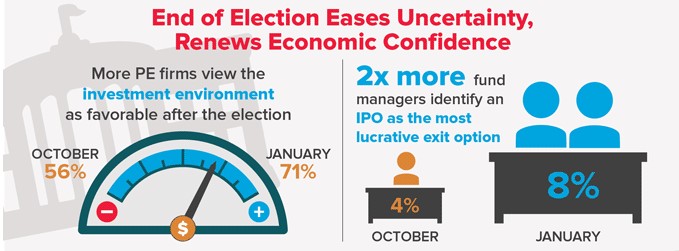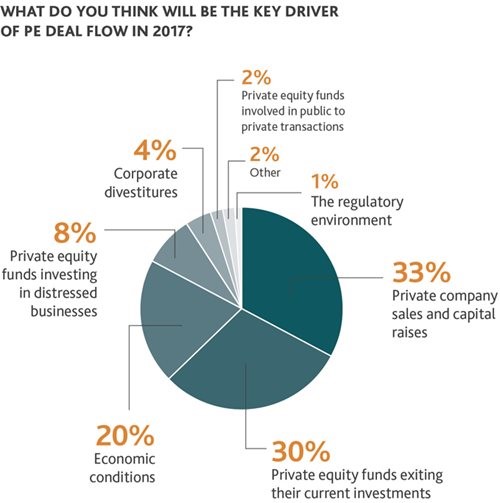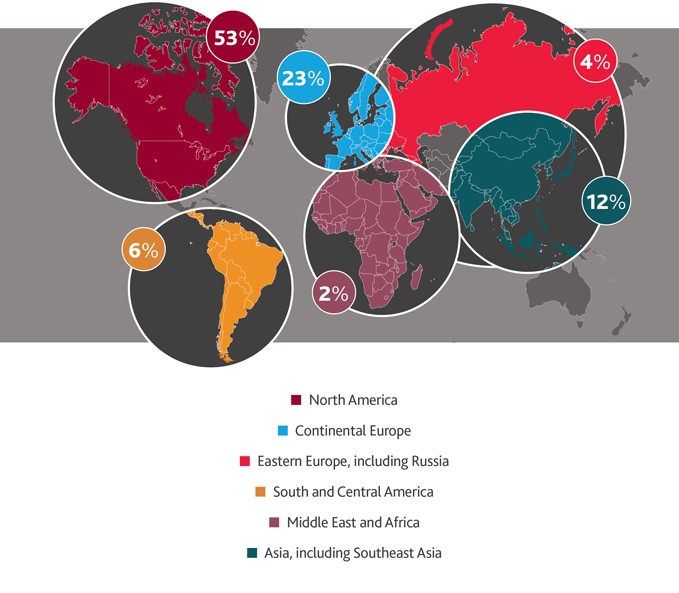Private Equity Fund Managers Expect a Sunnier 2017 After Volatile 2016
As the early months of 2017 take shape, it appears brighter days are expected ahead for the PE industry. According to BDO’s Eighth Annual PErspective Private Equity Study, fund managers are optimistic for the coming year.

Last year proved to be a challenging year for the private equity industry as market instability and political uncertainty took hold worldwide. According to PitchBook, total global PE deal value fell by 12 percent from 2015 levels, while deal volume declined 14 percent—a result of stiff competition from strategic buyers, ballooning valuations and a lack of promising targets as PE dry powder continued to amass.
As the early months of 2017 take shape, it appears brighter days are expected ahead for the PE industry. According to BDO’s Eighth Annual PErspective Private Equity Study, a survey of more than 200 fund managers across North America and Western Europe, fund managers are optimistic for the coming year. When the initial survey was conducted in October 2016, more than half (56 percent) of fund managers characterized the investment environment as favorable, while 44 percent said it was unfavorable—the highest proportion since 2014. In a follow-up poll conducted in early January, however, the number of fund managers reporting optimism jumped to 71 percent.1

Underlying this substantial growth in optimism may be easing economic uncertainty across the business landscape. The 2016 general election cycle—in conjunction with other major developments, including the shockwaves of Brexit, the contraction of the Chinese economy early in the year and continued volatility in commodity prices—created significant market fluctuations throughout the year. In October, 45 percent of fund managers said a transition in the presidential administration was their top global political concern, followed by Brexit (19 percent) and sovereign debt crises (14 percent).
However, in the weeks and months following the election, markets not only stabilized, but soared to record heights. Meanwhile, the Bureau of Labor Statistics’ February jobs report indicated that the economy added about 235,000 jobs that month, while average hourly wages grew 2.8 percent from February 2016. In response to these positive movements, the Fed raised interest rates in March for only the third time since June 2006.
With the election over, PE fund managers appear to be mirroring the optimism reflected in the equity and labor markets.
IPOs Poised to Make a Comeback
Reflecting the PE industry’s renewed optimism is improved sentiment toward the IPO market, which experienced a painful 2016. When asked which factor most contributed to 2016’s disappointing IPO environment a plurality (31 percent) point to high volumes of M&A activity, followed by poor IPO performance (28 percent) and a slowing global economy (24 percent).
Amid this uncertainty and pessimism, in October, just 4 percent of fund managers surveyed said an IPO was likely to be the most lucrative exit option in 2017. By January, that proportion had doubled to 8 percent, suggesting that the IPO market may be heating up as 2017 gains momentum.
Sales to strategic buyers remained the top-ranked exit option both in October and January, however, suggesting that even as conditions for IPOs improve, strategics will remain dominant players in the transactions space.
Examining exits and holding periods more broadly, many of the trends observed in last year’s PErspective Study hold true again for 2017: Holding periods are set to remain relatively consistent, with 61 percent of respondents saying their average holding period is between four and six years, and 84 percent of fund managers saying mismatched buyer and seller pricing expectations remain the primary obstacle to exit. In a more notable departure from the 2016 study, the number of fund managers reporting long-term holds (more than seven years) decreased from 16 percent to 9 percent.
“Amid this uncertainty and pessimism, in October, just 4 percent of fund managers surveyed said an IPO was likely to be the most lucrative exit option in 2017. By January, that proportion had doubled to 8 percent, suggesting that the IPO market may be heating up as 2017 gains momentum.”
Fund Managers Expect to See Improved Deal Flow Overall
Similar to IPOs, 2016 was a difficult year for overall deal flow. In our 2016 PErspective Study, one-quarter of fund managers anticipated investing $10 to $29 million in new deals and add-on acquisitions; however, this year’s data finds that 26 percent of respondents invested less than $10 million last year.
Many fund managers are realigning their expectations in 2017. Consistent with prior years, the largest proportion of respondents (28 percent) say they plan to close two new platform deals in the coming year, and 25 percent are looking to invest $10 to $29 million once again.

Key Drivers of PE Deal Flow in 2017
When asked about the key drivers of PE deal flow in the coming year, private company sales and capital raises are most frequently cited (33 percent), and PE exits are the second-most-cited at 30 percent. From a deal-sourcing perspective, industry or market specialization remains the most popular strategy, cited by 62 percent of fund respondents (up slightly from 57 percent last year). While most of the AUM brackets analyzed generally aligned with the overall trend, the number of fund managers reporting more than $1 billion in AUM and who are planning to leverage buy-side intermediaries nearly doubled this year.
Fund managers also expect to encounter similar challenges in 2017 that they experienced in the past. Forty-one percent of fund managers rank pricing as the top challenge facing PE firms, followed by maintaining portfolio company performance (23 percent), and the identification and quality of targets (22 percent). Despite continued public scrutiny of the private equity industry—in particular, continued debate surrounding the taxation of carried interest—just 1 percent of respondents say public perceptions of private equity is their top challenge.
Consistent with both the 2016 and 2015 editions of the PErspective Study, a majority (53 percent) of fund managers cite gaps between buyer and seller pricing expectations as the top hurdle they face when closing deals. Competition from financial buyers (25 percent) and strategic buyers (10 percent) are also frequently cited as leading challenges.
“When asked about the key drivers of PE deal flow in the coming year, private company sales and capital raises are most frequently cited (33 percent), and PE exits are the second-most-cited at 30 percent. “
Fundraising May Taper
This year’s survey marks the least optimistic year for fundraising since 2014, with just 53 percent of fund managers saying they are raising new funds from limited partners (LPs). This is down from 64 percent last year, 74 percent in 2015 and 61 percent in 2014.
Family offices remain the most common source of funds, with 46 percent of fund managers saying they provide the majority of their financial commitments. Larger firms ($501M in AUM and up) tend to skew more heavily toward pension funds, which is consistent with last year.
Technology and Energy Sectors Grow Riper for Investment
Last year, many market analysts expected to see investor appetite for technology companies right-size after years of skyrocketing valuations. However, despite some significant sector setbacks—such as the downfall of laboratory testing company Theranos—PE fund managers remain bullish on the industry, with two-thirds expecting to see increased valuations in the year ahead. At the same time, 70 percent expect to see valuations grow in the healthcare and biotech industry in 2017.
In a reflection of growing stability in the energy space, 44 percent of fund managers say the natural resources industry will see increasing valuations in the coming year, up from 36 percent last year and 34 percent in 2015. With OPEC reaching the first agreement to cut production in eight years—and some non-OPEC members, such as Russia, making similar promises—prices are back on the upswing. This spells good news for buyers and sellers alike: On the cusp of a new upswing, PE dollars may start to flow back into the industry, while sellers may be more willing to come to the table if they believe the worst has passed.
On the other hand, fund managers expect to see decreasing valuations in the retail and distribution (67 percent), real estate (49 percent) and manufacturing sectors (48 percent), pointing to continued volatility in these industries. Nevertheless, nearly one-quarter of fund managers say the manufacturing sector poses the greatest opportunity for new investment in the coming year as the Trump administration signals a renewed commitment to infrastructure improvements and domestic industry growth.
Meanwhile, 22 percent see promise in the technology industry, up slightly from 17 percent last year. This may be a reflection of the comparative bullishness of European respondents versus their North American counterparts: 27 percent of European fund managers say the technology space offers the greatest investment opportunity, compared with 19 percent of North American fund managers.
PE Firms Remain Tepid on International Investment
Consistent with results from 2015 and 2016, fund managers are generally cool toward international investment, with just 38 percent saying they plan to increase cross-border transactions in the year ahead. It is unsurprising, then, that North America and Continental Europe are ranked the most attractive regions for new investments, cited by 53 percent and 23 percent of respondents, respectively.
Latin America continues to decline in appeal, with just 6 percent of respondents citing it as a key investment region for 2017. Coming off a year of significant instability, and with the Trans-Pacific Partnership in legislative limbo, Asia also grew less attractive, with 12 percent of fund managers saying it presents the greatest opportunity for new investments—down from 15 percent last year.

Examining how North American and European respondents diverged in their responses, fund managers prefer investment opportunities in their own backyards: 46 percent of European respondents say Continental Europe presents the best investment opportunity, while 78 percent of North American respondents point to North America. European fund managers, however, are more optimistic about cross-border transactions, with a majority (58 percent) saying they plan to pursue more. European fund managers are also far more bullish on investment in Asia than their North American counterparts, with 17 percent citing it as a top region (versus 6 percent in North America).
In addition, Brexit looms large for European respondents. While just five percent of North American fund managers rate it as a top political concern this year, 46 percent of European fund managers express worry about its impact on PE investment.
Portfolio Performance Strengthens
Portfolio performance seems to be regaining momentum. Nearly three-quarters of fund managers say the value of their current portfolio, including all funds, has increased in the past year. Firms with more than $1 billion in AUM reported the most robust performance, with 86 percent saying their portfolio value increased in 2016. Of those fund managers reporting portfolio value increases, 75 percent cite growth of 6 to 25 percent, which is consistent with what respondents reported in prior years. Meanwhile, the proportion of respondents saying their portfolio decreased—10 percent—reached a four-year low. Almost all (90 percent) respondents reporting portfolio value decreases say those declines totaled 25 percent or less—the most modest decreases seen since 2014.
Looking specifically at portfolio companies, a plurality (25 percent) of fund managers say just 6 to 10 percent of their portfolio companies are performing below forecast, while 62 percent say that 15 percent or fewer of their portfolio companies are underperforming, representing the best year for performance since 2014.
“Portfolio performance seems to be regaining momentum. Nearly three-quarters of fund managers say the value of their current portfolio, including all funds, has increased in the past year. Firms with more than $1 billion in AUM reported the most robust performance, with 86 percent saying their portfolio value increased in 2016. “
Regulation Tightens Its Grip, but PE Firms Are Prepared
Regulators in both the United States and abroad continue to crack down on private equity firms, increasing oversight and looking to rein in an industry subject to fewer regulations than public companies. It appears, though, that many PE firms have already begun the work of enhancing compliance and staying up to date on the latest regulatory developments: Despite major headlines surrounding SEC enforcement actions, just 13 percent of fund managers say they’ve experienced increased scrutiny from the SEC.
It appears that PE firms’ 2017 regulatory priorities will likely look similar to 2016. When asked which steps they have taken in response to increased SEC oversight, 68 percent of fund managers point to enhancing internal controls, a slight uptick from 63 percent in 2016. In addition, 36 percent say they have focused on improving fee transparency, 28 percent say they have updated LP agreements to further enhance fee clarity, and 23 percent say they are focused on monitoring agreements. Dodd-Frank remains the most impactful regulation PE firms face, ranked as a top concern by 39 percent of respondents.
Overall, the private equity industry has experienced a tumultuous two years, with economic headwinds in 2016 proving particularly challenging. It appears, however, that 2017 is set to usher in renewed prosperity as the economy improves, the political dust settles and private equity continues to grow in prominence as the alternative asset class of choice. As we look ahead to the remainder of 2017, we may expect to see private equity remain a key player in global transactions—including IPOs—as well as a highly sought capital solution for companies across industries looking to seize emerging growth opportunities.
About the Study
The BDO Eighth Annual PErspective Private Equity Study is an international survey of more than 200 senior executives at private equity firms throughout the U.S. and Western Europe. The survey is administered by PitchBook, an independent and impartial research firm dedicated to providing premium data, news and analysis to the private equity industry.
About BDO’s Private Equity Practice
Strategically-focused and remarkably responsive, the experienced, multi-disciplinary partners and directors of BDO’s Private Equity practice provide value-added assurance, tax and consulting services for all aspects of a fund’s cycle, wherever private equity firms are investing.
About BDO USA
BDO is the brand name for BDO USA, LLP, a U.S. professional services firm providing assurance, tax, advisory and consulting services to a wide range of publicly traded and privately held companies. For more than 100 years, BDO has provided quality service through the active involvement of experienced and committed professionals. The firm serves clients through more than 60 offices and over 500 independent alliance firm locations nationwide. As an independent Member Firm of BDO International Limited, BDO serves multi-national clients through a global network of 1,400 offices across 158 countries.
BDO USA, LLP, a Delaware limited liability partnership, is the U.S. member of BDO International Limited, a UK company limited by guarantee, and forms part of the international BDO network of independent member firms. BDO is the brand name for the BDO network and for each of the BDO Member Firms. For more information please visit: www.bdo.com.
1 The initial PErspective Private Equity Study survey was conducted in October 2016. To gauge how respondent sentiments may have changed over the course of Q4 2016, respondents were contacted again in late December 2016 and early January 2017 to provide follow-up responses to the following questions:
- In your view, is the current environment favorable for private equity funds looking to invest?
- What do you think will be the key drivers of private equity deal flow in the next 12 months?
- Which of the following exit options do you expect to generate the greatest returns during the next 12 months?
- Are you raising new funds from Limited Partners?
Sixty-eight fund managers responded to this follow-up survey. Unless otherwise specified, data in this report has been pulled from the October 2016 poll.


